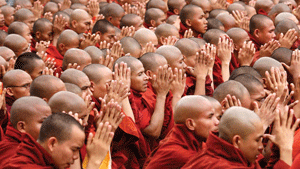A Monk’s Tale
A leading activist monk recounts his personal experiences of oppression and torture at the hands of Burma’s self-appointed protectors of the Buddhist faith
ASHIN Pyinnya Jota is the deputy abbot of Rangoon’s Maggin Monastery. He has also been a political prisoner twice since 1990. Now, nearly six months after Burma’s military rulers crushed monk-led protests last September, he is in hiding in a monastery in the Thai border town of Mae Sot, opposite Myawaddy.
The 48-year-old monk played a leading role in last year’s uprising as one of the founding members of the All Burma Monks Alliance. After months of evading the authorities in Burma, he finally fled to Thailand in early February.
 |
| Monks praying at Shwedagon Pagoda in Rangoon before joining an anti-government march on September 24, 2007. (Photo: Reuters) |
“People’s suffering can easily move monks,” he said during a recent interview with The Irrawaddy, referring to the dramatic increase in fuel prices that led to widespread hardship. “As sons of the Buddha, how can we ignore the disasters that afflict people’s lives? So we took a leading role against evil rulers who have shown no concern for the needs of the people.”
When monks in the central Burmese town of Pakokku took to the streets chanting the “Metta Sutta” (the Buddha’s discourse on loving-kindness), security forces and members of the junta-backed Swan Ah Shin militia responded with brutal force. Monks were beaten with rifle butts, some after being tied to electricity poles. But this attempt to intimidate the monks backfired and soon they were demanding an apology from the authorities.
“But as you know, the generals don’t think it is their business to apologize for anything,” said Pyinnya Jota. “Instead of expressing remorse, the military rulers just repeated their evil acts.”
In predominantly Buddhist Burma, religious resistance to unjust rule takes a unique form: monks refuse to receive donations of food and other requisites from members of the armed forces or their families in a ritual known as “pattam nikkujjana kamma,” the overturning of alms bowls. This practice, which is tantamount to excommunication, has been used for centuries as a nonviolent means of addressing transgressions by lay people.
“We monks should show our disagreement with evil acts in a peaceful way,” said Pyinnya Jota, who added that no monks would have taken part in the protests if their monastic rules did not permit it.
“The generals say they are good Buddhists, that they are like kings working to strengthen Buddhism. But they are completely wrong, because they never stop committing unjust acts and don’t resolve problems in a peaceful way,” he said.
Maggin Monastery, where Pyinnya Jota has been a monk since 2005, was targeted by the military authorities during last year’s crackdown because of its reputation as a hotbed of dissent. A number of monks and laymen were arrested in the course of several raids on the monastery, which was closed by the authorities on November 29.
“Raiding monasteries is like raping Buddhism,” said the senior monk. “This is an unspeakable offense against the religion, and it is also inexcusable from the point of view of social ethics. Even the British colonialists did not storm monasteries, beating and arresting monks and forcibly closing these sacred places to the public.”
Despite the harsh crackdown on the protests, which was reminiscent of the crushing of the 1988 uprising, Pyinnya Jota remains convinced that people power will ultimately prevail in Burma.
He also believes that high-ranking members of the military will play a more prominent role in future efforts to bring about political change in Burma, despite their conspicuous absence both last year and in 1988. “If the movement continues to gain momentum, members of the military will join in,” he said. “Therefore pro-democracy groups should think about how to build mass power effectively.”
Meanwhile, however, most of the leaders of the movement to end military rule are in prison or in hiding.
In February, Pyinnya Jota finally made his escape from Burma, as the regime’s dragnet threatened to close in on him.
1 | 2 next page »
